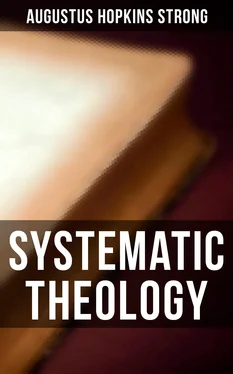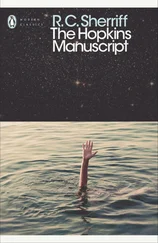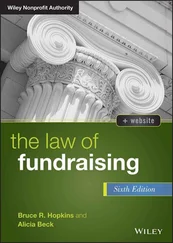Sir William Hamilton consistently declares that the highest achievement of science is the erection of an altar “To the Unknown God.” This, however, is not the representation of Scripture. Cf. John 17:3—“this is life eternal, that they should know thee, the only true God” ; and Jer. 9:24—“let him that glorieth glory in that he hath understanding and knoweth me.” For criticism of Hamilton, see H. B. Smith, Faith and Philosophy, 297–336. Fichte: “We are born in faith.” Even Goethe called himself a believer in the five senses. Balfour, Defence of Philosophic Doubt, 277–295, shows that intuitive beliefs in space, time, cause, substance, right, are presupposed in the acquisition of all other knowledge. Dove, Logic of the Christian Faith, 14—“If theology is to be overthrown because it starts from some primary terms and propositions, then all other sciences are overthrown with it.” Mozley, Miracles, defines faith as “unverified reason.” See A. H. Strong, Philosophy and Religion, 19–30.
B. Faith is a knowledge conditioned by holy affection.—The faith which apprehends God's being and working is not opinion or imagination. It is certitude with regard to spiritual realities, upon the testimony of our rational nature and upon the testimony of God. Its only peculiarity as a cognitive act of the reason is that it is conditioned by holy affection. As the science of æsthetics is a product of reason as including a power of recognizing beauty practically inseparable from a love for beauty, and as the science of ethics is a product of reason as including a power of recognizing the morally right practically inseparable from a love for the morally right, so the science of theology is a product of reason, but of reason as including a power of recognizing God which is practically inseparable from a love for God.
We here use the term “reason” to signify the mind's whole power of knowing. Reason in this sense includes states of the sensibility, so far as they are indispensable to knowledge. We cannot know an orange by the eye alone; to the understanding of it, taste is as necessary as sight. The mathematics of sound cannot give us an understanding of music; we need also a musical ear. Logic alone cannot demonstrate the beauty of a sunset, or of a noble character; love for the beautiful and the right precedes knowledge of the beautiful and the right. Ullman draws attention to the derivation of sapientia, wisdom, from sapĕre, to taste. So we cannot know God by intellect alone; the heart must go with the intellect to make knowledge of divine things possible. “Human things,” said Pascal, “need only to be known, in order to be loved; but divine things must first be loved, in order to be known.” “This [religious] faith of the intellect,” said Kant, “is founded on the assumption of moral tempers.” If one were utterly indifferent to moral laws, the philosopher continues, even then religious truths “would be supported by strong arguments from analogy, but not by such as an obstinate, sceptical heart might not overcome.”
Faith, then, is the highest knowledge, because it is the act of the integral soul, the insight, not of one eye alone, but of the two eyes of the mind, intellect and love to God. With one eye we can see an object as flat, but, if we wish to see around it and get the stereoptic effect, we must use both eyes. It is not the theologian, but the undevout astronomer, whose science is one-eyed and therefore incomplete. The errors of the rationalist are errors of defective vision. Intellect has been divorced from heart, that is, from a right disposition, right affections, right purpose in life. Intellect says: “I cannot know God”; and intellect is right. What intellect says, the Scripture also says: 1 Cor. 2:14—“the natural man receiveth not the things of the Spirit of God: for they are foolishness unto him; and he cannot know them, because they are spiritually judged”; 1:21—“in the wisdom of God the world through its wisdom knew not God.”
The Scripture on the other hand declares that “by faith we know” (Heb. 11:3) . By “heart”the Scripture means simply the governing disposition, or the sensibility + the will; and it intimates that the heart is an organ of knowledge: Ex. 35:25—“the women that were wise-hearted” ; Ps. 34:8—“O taste and see that Jehovah is good” = a right taste precedes correct sight; Jer. 24:7—“I will give them a heart to know me” ; Mat. 5:8—“Blessed are the pure in heart; for they shall see God” ; Luke 24:25—“slow of heart to believe” ; John 7:17—“If any man willeth to do his will, he shall know of the teaching, whether it is of God, or whether I speak from myself” ; Eph. 1:18—“having the eyes of your heart enlightened, that ye may know” ; 1 John 4:7, 8—“Every one that loveth is begotten of God, and knoweth God. He that loveth not knoweth not God.” See Frank, Christian Certainty, 303–324; Clarke, Christ. Theol., 362; Illingworth, Div. and Hum. Personality, 114–137; R. T. Smith, Man's Knowledge of Man and of God, 6; Fisher, Nat. and Method of Rev., 6; William James, The Will to Believe, 1–31; Geo. T. Ladd, on Lotze's view that love is essential to the knowledge of God, in New World, Sept. 1895:401–406; Gunsaulus, Transfig. of Christ, 14, 15.
C. Faith, therefore, can furnish, and only faith can furnish, fit and sufficient material for a scientific theology.—As an operation of man's higher rational nature, though distinct from ocular vision or from reasoning, faith is not only a kind, but the highest kind, of knowing. It gives us understanding of realities which to sense alone are inaccessible, namely, God's existence, and some at least of the relations between God and his creation.
Philippi, Glaubenslehre, 1:50, follows Gerhard in making faith the joint act of intellect and will. Hopkins, Outline Study of Man, 77, 78, speaks not only of “the æsthetic reason” but of “the moral reason.” Murphy, Scientific Bases of Faith, 91, 109, 145, 191—“Faith is the certitude concerning matter in which verification is unattainable.” Emerson, Essays, 2:96—“Belief consists in accepting the affirmations of the soul—unbelief in rejecting them.” Morell, Philos. of Religion, 38, 52, 53, quotes Coleridge: “Faith consists in the synthesis of the reason and of the individual will, … and by virtue of the former (that is, reason), faith must be a light, a form of knowing, a beholding of truth.” Faith, then, is not to be pictured as a blind girl clinging to a cross—faith is not blind—“Else the cross may just as well be a crucifix or an image of Gaudama.” “Blind unbelief,” not blind faith, “is sure to err, And scan his works in vain.” As in conscience we recognize an invisible authority, and know the truth just in proportion to our willingness to “do the truth,” so in religion only holiness can understand holiness, and only love can understand love (cf. John 3:21—“he that doeth the truth cometh to the light” ).
If a right state of heart be indispensable to faith and so to the knowledge of God, can there be any “theologia irregenitorum,” or theology of the unregenerate? Yes, we answer; just as the blind man can have a science of optics. The testimony of others gives it claims upon him; the dim light penetrating the obscuring membrane corroborates this testimony. The unregenerate man can know God as power and justice, and can fear him. But this is not a knowledge of God's inmost character; it furnishes some material for a defective and ill-proportioned theology; but it does not furnish fit or sufficient material for a correct theology. As, in order to make his science of optics satisfactory and complete, the blind man must have the cataract removed from his eyes by some competent oculist, so, in order to any complete or satisfactory theology, the veil must be taken away from the heart by God himself (cf. 2 Cor. 3:15, 16 —“ a veil lieth upon their heart. But whensoever it [marg. ‘a man’] shall turn to the Lord, the veil is taken away ”).
Читать дальше












